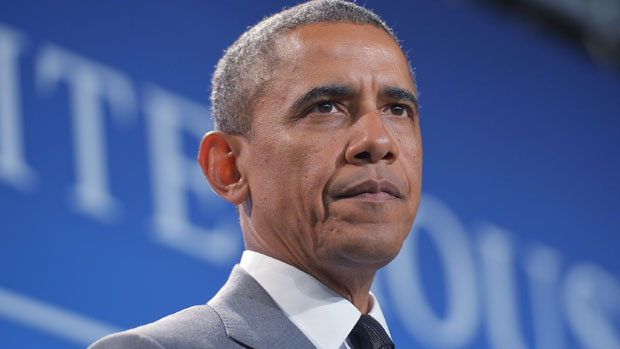Obama seeks $500m to train 'moderate' Syrian opposition
White House searches for effective alternatives to jihadist army active in Syria and Iraq

A free daily email with the biggest news stories of the day – and the best features from TheWeek.com
You are now subscribed
Your newsletter sign-up was successful
President Obama has proposed to increase American involvement in Syria's civil war, asking Congress to approve the release of $500m to support and train what he described as "moderate" Syrian opposition forces.
The National Security Council said that money requested by the government would "help defend the Syrian people, stabilise areas under opposition control, facilitate the provision of essential services, counter terrorist threats, and promote conditions for a negotiated settlement".
At a speech at the West Point military academy last month, Obama pledged to step up support for opposition forces in Syria. The administration is anxious to find effective alternatives to "the jihadist army that has taken over vast swaths of Syria and Iraq for an Islamic state", The Guardian reports.
The Week
Escape your echo chamber. Get the facts behind the news, plus analysis from multiple perspectives.

Sign up for The Week's Free Newsletters
From our morning news briefing to a weekly Good News Newsletter, get the best of The Week delivered directly to your inbox.
From our morning news briefing to a weekly Good News Newsletter, get the best of The Week delivered directly to your inbox.
The advance of Isis into neighbouring Iraq prompted Obama to take action, the BBC says.
Since the Syrian civil war began, an estimated 150,000 people have been killed and a million more displaced by fighting between rebels and forces loyal to President Bashar al-Assad.
"This funding request would build on the administration's longstanding efforts to empower the moderate Syrian opposition, both civilian and armed," the White House said.
The money will also "enable the Department of Defense to increase our support to vetted elements of the armed opposition". It may fund US military training for the Syrians in Jordan, where the US military already trains its Iraqi counterparts, the Guardian says.
A free daily email with the biggest news stories of the day – and the best features from TheWeek.com
Neither the Pentagon nor the State Department have released plans for how the money would be spent, the New York Times reports, and it is still unclear whether and when Congress will approve the request.
"There's not a lot of detail here," said Gordon Adams, a professor of foreign policy at American University. Congressional lawmakers, he added, are "going to immediately say, 'what's it for?'".
-
 Antonia Romeo and Whitehall’s women problem
Antonia Romeo and Whitehall’s women problemThe Explainer Before her appointment as cabinet secretary, commentators said hostile briefings and vetting concerns were evidence of ‘sexist, misogynistic culture’ in No. 10
-
 Local elections 2026: where are they and who is expected to win?
Local elections 2026: where are they and who is expected to win?The Explainer Labour is braced for heavy losses and U-turn on postponing some council elections hasn’t helped the party’s prospects
-
 6 of the world’s most accessible destinations
6 of the world’s most accessible destinationsThe Week Recommends Experience all of Berlin, Singapore and Sydney
-
 Epstein files topple law CEO, roil UK government
Epstein files topple law CEO, roil UK governmentSpeed Read Peter Mandelson, Britain’s former ambassador to the US, is caught up in the scandal
-
 Iran and US prepare to meet after skirmishes
Iran and US prepare to meet after skirmishesSpeed Read The incident comes amid heightened tensions in the Middle East
-
 Syria’s Kurds: abandoned by their US ally
Syria’s Kurds: abandoned by their US allyTalking Point Ahmed al-Sharaa’s lightning offensive against Syrian Kurdistan belies his promise to respect the country’s ethnic minorities
-
 Israel retrieves final hostage’s body from Gaza
Israel retrieves final hostage’s body from GazaSpeed Read The 24-year-old police officer was killed during the initial Hamas attack
-
 China’s Xi targets top general in growing purge
China’s Xi targets top general in growing purgeSpeed Read Zhang Youxia is being investigated over ‘grave violations’ of the law
-
 Syria’s Islamic State problem
Syria’s Islamic State problemIn The Spotlight Fragile security in prison camps leads to escape of IS fighters
-
 Panama and Canada are negotiating over a crucial copper mine
Panama and Canada are negotiating over a crucial copper mineIn the Spotlight Panama is set to make a final decision on the mine this summer
-
 Why Greenland’s natural resources are nearly impossible to mine
Why Greenland’s natural resources are nearly impossible to mineThe Explainer The country’s natural landscape makes the task extremely difficult